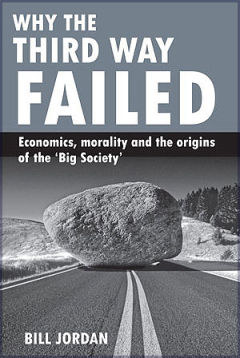Bill Jordan's book describes the development and failure of the 'Third Way' and it latest iteration 'Big Society.'
Author: Bill Jordan
Reviewed by: Jim Elder-Woodward
Once more the eclectic Bill Jordan has written a vast landscape of diverse knowledge and facts in his criticism of both yesterday’s Third Way by New Labour and today’s Big Society from the present ConLib government in this book. Jordan raises some interesting fundamental questions behind the idea of the ‘Third Way’, which underpinned policies of the last Labour administration (1997-2008); and upon which some of the present ConLib Coalition is progressing further - particularly in the field of economic welfare reform.

Jordan begins by discussing New Labour’s Welfare Reform Act of 2008 which enabled benefits administration to be contracted out to private companies. These firms were to be paid extra bonuses according to their success in placing claimants in employment.
Contracting out employment services to the private and voluntary sector on a payment by result basis is also the policy the present Government is pursuing. However, now the present Government is using the savings from moving Incapacity Benefit to JSA to pay these companies by their results, so there is no ‘up-front’ money being provided to find these people jobs this time.
Jordan refers to a 2009 Channel 4 television programme, “The Benefits Busters”. New Labour had given a private company A4E £800m to run their ‘Flexible New Deal Scheme’. Channel 4 had filmed A4E’s pilot project which gave ‘tough love’ to unemployed single mothers in their efforts to get them back into the labour market.
The TV programme followed the work of the pilot project manager, or “Fairy Jobmother”, Hayley Taylor, as she told the women she “would not hesitate to take action … to suspend your benefits” if she did not receive their full co-operation. She insisted on a strict dress code, saying her “bible” was a book based on a TV make-over programme. Her goal, through this process of ‘tough love’ (a mixture of bullying and counselling), was to get these women jobs in the local Poundland shop as cashiers. Indeed four of them did get trial jobs, but one left because, with four children to feed, she wasn’t earning as much as she would receive on benefits.
Jordan raises some fundamental questions, flowing from this TV programme, which he divides into three areas:
“Distribution roles and resources: work and income
Regulation and enforcement: power relations
Interpersonal relations: the moral regulation of ‘advice’
Jordan considers these questions are inadequately addressed, or even recognised, by Third Way policies. He feels the stream of Third Way discussion papers and ‘welfare reforms’:
“… has consistently sought to justify institutional changes which erode the rights of benefits claimants and weaken the protection for low-paid workers; which give officials more power to enforce conditions and low-paid work on claimants; and … which give largely unregulated and unrestrained private agencies licence to practice ‘training’, ‘counselling’ and job placement. The rationale for these approaches is derived from economic theory, but legitimated by a cod morality – the duty to take responsibility for oneself; the obligation not to be a burden on the taxpayer; the state’s role to make employment the most reliable route out of poverty.”
Such a trajectory of welfare reform is being assisted by the ‘big society’ debate. After denying the value of community, or communal, support, the Conservatives have now got the Big Society Bug; wishing to minimise central control and provision in favour of local collective, or personal, decision-making and arrangements.
Jordan points out two weaknesses to the Big Society. First, the time it takes for groups or self-organised bodies to develop. This will allow commercial interests to fill the gaps which will inevitably appear in the market. Second, any such new organisation of mutual support will be homogeneous, due to the lack of solidarity among and between socio-economic cultures within society. This will again inevitably favour the better off and more experienced members of society, leading to even greater inequalities of resources and power.
This book is more likely to be prophetic than alarmist. As such, it should be essential reading for all of us.
Why The Third Way Failed by Bill Jordan is available to buy from Policy Press.
The publisher is Policy Press.
Why The Third Way Failed © Bob Jordan 2010.
Review of Why The Third Way Failed © Jim Elder-Woodward 2011.
All Rights Reserved. No part of this paper may be reproduced in any form without permission from the publisher except for the quotation of brief passages in reviews.
nature & economics, politics, tax and benefits, Reviews